National Association for the Practice of Anthropology
Student Awardee Information 2006
First Place: Allison D. Harnish, Undergraduate (Western Kentucky University) “Conflict and Opportunity: A Qualitative Study of Community Attitudes towards Ecotourism and the Bushmeat Trade in Kasigau, Kenya”
The problem of bushmeat and the potential for sustainable community-based ecotourism are two very significant issues facing various rural pastoral and horticultural populations living in Africa today. Bushmeat, or illegally obtained wildlife meat, has in recent years become a massive threat to African biodiversity and, as such, a threat to the vital tourist industries of multiple African nations. Ecotoursim, or conservation-minded travel to exotic lands that supports the environment and the well-being of local people, is widely regarded as a viable option for alleviating the disastrous effects of the bushmeat trade and also for reducing the consumptive land use practices that not only threaten native animal species, but also the survival of rural human populations. To more deeply investigate these subjects, in summer, 2005, students and faculty from Western Kentucky University and the University of Nairobi traveled to the Taita Taveta district of southern Kenya to perform research into the development of a sustainable, ecologically sound, and ecotourism-based model of wildlife management in the small town of Kasigau. In the long term, the team of investigators hopes their work will reduce poaching, increase feelings of enfranchisement in the local populace, and produce a model economic system for similar rural communities throughout Kenya to emulate. Focus group interviews and participant observations were conducted in order to gauge the attitudes of locals towards the consumption of bushmeat and the establishment of ecotourism in the community. This paper seeks to provide a general overview of bushmeat and ecotourism as well as summarize the results of this research within the wider context of Kenyan society.
Second Place: Noel B. Salazar, Ph.D. Candidate (University of Pennsylvania) “public interest anthropology among Tanzanian tour guides: Consultancy, teaching… and a lot of learning”
This paper explores how a Public Interest Anthropology (PIA) approach can help engaged anthropologists, and in particular students, to successfully combine their activist drive to change and improve the situation of the people they encounter while doing fieldwork with a more academic concern to grasp the complexities of the contexts in which they work. I do this by presenting and reflecting upon my own work with tour guides in Arusha, Tanzania. During my fieldwork, I performed three partially overlapping tasks: (1) I collaborated with a non-profit organization in a project to improve tour guide training programs; (2) I taught as a guest lecturer in anthropology at a local guiding school; and (3) I did fieldwork in the more traditional sense of the word, trying to understand the politics and poetics of tour guiding. It was the mixture of these different roles and activities that enabled me to establish more solid local working relationships, which in turn allowed me to better address some of the needs of the people I was working with and, at the same time, produced more valuable insights for my own research.
Third Place: Mark Schuller, Ph.D. Candidate (University of California, Santa Barbara) “Directing Democracy: Uses of NGOs in Haiti”
Non-governmental organizations (NGOs) are promoted in official circles as beacons of participation and direct democracy. Anthropologists have begun challenging this interpretation, arguing that this development is insidious, weakening southern states and paving the way for neoliberal globalization. This paper presents a critical ethnographic evaluation of the U.S. government’s promotion of direct democracy in Haiti. Central to the recent U.S. “democratization” effort in Haiti is USAID’s instrumental use of NGOs. Drawing from 20 months of fieldwork among women’s NGOs in Haiti and three months in Washington DC, I compare representations of democratic participation in official development discourse with the lived realities and perspectives of social actors comprising the “target populations” of NGOs.



